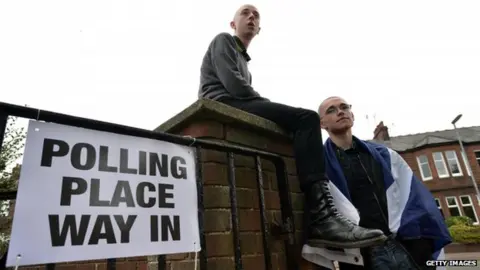Welsh election 2021: How did votes for younger people happen?
 Getty Images
Getty ImagesFor the first time in Wales' history, 70,000 16 and 17-year-olds will help decide who sits in the Welsh Parliament, after the voting age was lowered.
For May's Senedd elections, 33,000 foreign nationals will also be able to take part for the first time.
The move follows Scotland - where 16 and 17-year-olds cast votes in the 2014 independence referendum and then in the 2016 Holyrood election.
The changes in Wales now mean 16 and 17-year-olds can vote for someone to be their representative at the Welsh Parliament (or Senedd).
This will then lead to a Welsh government being formed which will decide on how to look after matters including health and education in Wales.
However, this age group will still have no say in voting for an MP to be sent from their area to the UK government in Westminster.
What is the background?
 Getty Images
Getty ImagesChanges to who votes in devolved elections, what the elected members are called, and where they sit were debated in November 2019.
As well as giving 16 and 17-year-olds and foreign nationals the right to vote, the bill included legislation to change the name of the institution to Senedd Cymru/Welsh Parliament.
It needed a two-thirds majority to pass and 41 of the 60 Assembly Members (AMs) were in favour - meaning their titles would also change to Members of the Senedd (MSs).
Labour and Plaid Cymru backed it, but the Conservatives and the Brexit Party were against.

The presiding officer - the person who chairs the meetings of the Welsh Parliament/Senedd - at the time, Elin Jones, said it would "empower young people to participate in the democratic process".
But the inclusion of votes for foreign nationals following Welsh government amendments earlier in the process upset the Conservatives, despite some having backed votes for 16-year-olds.
Tory group leader Andrew RT Davies called it a "stitch-up" by the "left-wing political establishment".
How will it affect voting numbers?
At the last Welsh election in 2016, about 1,020,000 people cast their votes.
According to the Electoral Commission, there were 2.25 million adults eligible to vote at the time making it a turnout of 45.2%.
 Getty Images
Getty ImagesAbout 103,000 more people will be added to the numbers of those eligible in May, with 16 and 17-year-olds plus foreign nationals included.
However, they must register their intention to vote before 19 April.
The legislation has since been extended so teenagers can also vote in council elections in Wales, with the next due to take place in May 2022.
How engaged are young people?
Research published just before the first lockdown in March 2020 suggested young people in Wales had a "very limited" understanding of Welsh politics.
Analysts from Beaufort Research spoke to 148 participants including 14 to 17-year-olds, disengaged adults and foreign nationals.
Among the research it found many did not know who Wales' first minister was or what the Welsh government did.
Nevertheless, the same researchers found 72% of 16 to 17-year-olds wanted the right to vote, compared with 12% against.
Since then, the coronavirus pandemic has offered a whole new level of awareness of the differences in who makes the rules in different parts of the UK with Google searches over the past 12 months in Wales alone showing how many more people tried to find out what specific rules applied in what nation.
In February, polling by the Electoral Reform Society (ERS) and YouGov found that 69% of 16 to 24-year-olds thought the Senedd elections were important - a higher proportion than in any other age group, except the over-65s.
It called on them to publish easily-accessible and engaging manifestos targeted at young people, consider new voters when creating policies and participate in hustings and other events for newly-enfranchised voters.
"This has the potential to build a new generation of active citizens," said Jess Blair of ERS Cymru,
"Parties must not miss this chance, and we all have a role to play in making the May elections the accessible, democratic success they can be."
How successful has it been elsewhere?

Perhaps the most stark illustration of how 16 and 17-year-olds vote differently to other age groups came in the 2014 Scottish independence referendum.
A survey, commissioned by Conservative peer Lord Ashcroft, found 71% of that age group voted for the country to break away from the rest of the UK, compared with 29% who voted against.
Overall, Scots voted by a margin of 55% to 45% against separation.
 Getty Images
Getty ImagesThe Isle of Man became the first place in Europe to have a voting age of 16, in 2006, followed by Guernsey in 2007 and Austria in 2011.
Then Scotland followed, with 100,000 registering to vote in the independence referendum.
According to the Electoral Commission, the number dropped to 80,000 when the age group was again allowed to vote in the 2016 Scottish Parliament election.
Those aged 16 and 17 have so far not been allowed to take part in any elections in England.
